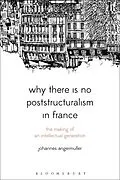French thinkers such as Lacan and Derrida are often labelled as representatives of 'poststructuralism' in the Anglophone world. However in France, where their work originated, such a category has never gained currency; this group of theorists were never perceived as a coherent intellectual group or movement. Outlining the institutional contexts, affinities, and rivalries of, among others, Althusser, Lacan, Barthes, Foucault, Derrida and Kristeva, Why There is No Poststructuralism in France insightfully traces the evolution of the French intellectual field after the war and Poststructuralism as a phenomenon. By critically embracing Bourdieu's concept of intellectual field, Angermuller places French Theory both in the specific material conditions of its production and the social and historical contexts of its reception, accounting for a particularly creative moment in French intellectual life which continues to inform the theoretical imaginary of our time.
Autorentext
Johannes Angermüller is Professor of Discourse at the University of Warwick, UK.
Inhalt
Preface
1 Introduction: The Intellectual Field in France
1.1 'Poststructuralism': An international misunderstanding?
1.2 Structuralism and poststructuralism in the sociology of intellectuals
2 Structuralism versus Poststructuralism: The Birth of an Intellectual Generation
2.1 The transformations of Theory: From structuralism to 'poststructuralism'
2.2 Why there is no poststructuralism in France: Foucault, Derrida & Co. in the French intellectual field
3 Rise and Decline of the Structuralist Generation
3.1 From modernity to postmodernity: The intellectual field since the Enlightenment
3.2 The boom of the human sciences in the 1960s and 1970s
3.3 The formation of the structuralist generation
3.4 The neoliberal turn of the 1980s
4 From Theory in France to French Theory: The Making of 'Poststructuralism' in the Post-national University
5 The Moment of Theory: The Social after Society
Notes
References
Index
